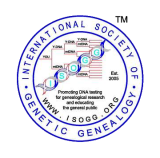Choosing a DNA testing company
From ISOGG Wiki
There are a number of points to consider when choosing a DNA testing company which sells DTC (direct to consumer) kits.
Note that for some surnames it is possible to get a free Y-DNA test or partial sponsorship towards the cost of testing. Check out the Wiki page on free DNA tests to see if your surname is listed.
What is the size of the company's database?
Most genetic genealogy tests depend on finding matches in the company's database. The size of the matching database and the ability to look for matches is therefore very important.
Which countries does the company sell to?
Does the company actively market its products in your country? Note that most of the big testing companies are based in America and Americans are therefore the dominant customer base in the genetic genealogy market.
What is the long-term sustainability of the company?
How long have the company been in business? What is their profitability and funding? How big are they and what is their long term strategy? What are executive and critical technical and research employee succession plans?
What other products do the company offer?
Does the company have a wide-ranging selection of products? Do they allow integration with offerings from other companies? Does it have a record of innovation? Will it be possible to upgrade in the future as new discoveries are made? Remember to differentiate between what's been proven and what's merely a promise as well as who is making the promise. This is always a challenge for the individual customer.
What level of customer support is provided?
Is there a help desk? Can you contact the company by e-mail or telephone? How long do they take to respond to enquiries?
How safe is your data?
What is the company's privacy policy? What would happen if the company were to be sold?
What are the scientific credentials of the company?
Does the company employ scientists to oversee product development and interpretation? Does the company have a scientific advisory board? Does it have any affiliations with scientific organisations?
Does the company offer the facility to store samples?
Sample storage is important if you don't want the bother of submitting a new sample every time a new test becomes available. Sample storage is critical for upgrading tests for deceased relatives. Does the company allow you to nominate a beneficiary for your DNA account?
Does the company allow you access to your raw data?
Access to raw data is important if you wish to make use of the many third-party tools which are available. Access to raw data is also important for interpretation of the data by citizen scientists and can serve as a useful check against the interpretation provided by the company.
Do you have to maintain a subscription to access all the features and services?
Some companies and organisations will provide basic services for free but a charge a subscription or premium prices to access additional features.
Does the company have project administration facilities?
DNA testing works best when you have other results available for comparison, and this is best done within the confines of a DNA project. Does the company support project management? What facilities are provided?
What are the shipping costs?
If you buy a DNA test from an overseas company the postage can often add considerably to the cost of the test. Some companies only send out their kits using a courier service. For information on package forwarders see the Wiki article on shipping DNA kits.
Further reading
- Direct-to-consumer genetic tests Consumer information from the Federal Trade Commission (US) with a focus on health testing (Page archived by the Wayback Machine]
- Direct-to-consumer tests Guidance from the US Food and Drug Administration
- Direct-to-consumer genetic testing and privacy Advice from the Office of the Privacy Commissioner in Canada
- Read this before you buy a genetic testing kit by Catherine Roberts, Consumer Reports, 2 February 2021.
- Questions to ask before you buy a genetic testing kit on Black Friday by Rachele Hendricks-Sturrup and Katelyn Ringrose, Future of Privacy Forum, 26 November 2019
- Selling genetic testing kits: read on by Elisa Jillson. Federal Trade Commission, 21 March 2019.
- How do you check out an online test for its reliability? by Brianne Kirkpatrick, Watershed DNA, 8 December 2017.
- DNA tests: consider the privacy implications by Leslie Fair, Federal Trade Commission, 12 December 2017.
- Coakley L. Which DNA testing company should I use? Genie1 blog (a review from the perspective of people living in Australia and New Zealand
- Griffith S. Buyer beware links. Genealogy Junkie, 14 May, 2014.
- Griffith S. Notes for UK (& Ex-US) residents re DNA testing companies. Genealogy Junkie, 16 January 2014.
- MacArthur D. Ready to test your DNA: how to choose a genetic testing company. PRI's The World, 22 March 2012.
- Aulicino E. Which DNA testing company fits your needs? Genealem blog, 23 May 2009.
- Wagner JK, Cooper JD, Sterling R, and Royal CD. Tilting at windmills no longer: a data-driven discussion of DTC DNA ancestry tests. Genetics in Medicine 2012:14(6):586–593. The article provides a snapshot of the direct-to-consumer DNA ancestry testing industry in April 2010 based on a survey of company websites.
